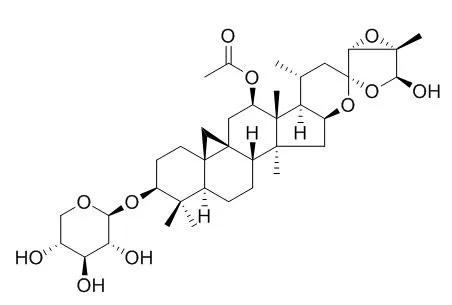| Kinase Assay: |
| Fitoterapia. 2013 Dec;91:28-38. | | Actein induces calcium release in human breast cancer cells.[Pubmed: 23939423] | The triterpene glycoside Actein from the herb black cohosh preferentially inhibits the growth of breast cancer cells and activates the ER stress response. The ER IP3 receptor and Na,K-ATPase form a signaling microdomain. Since Actein is lipophilic, its action may be limited by bioavailability. To develop Actein to prevent and treat cancer, we examined the primary targets and combinations with chemotherapy agents, as well as the ability of nanoparticles to enhance the activity.
METHODS AND RESULTS:
To reveal signaling pathways, we treated human breast and colon cancer, as well as 293T and 293T (NF-κB), cells with Actein, and measured effects using the MTT, luciferase promoter, Western blot and histology assays. To assess effects on calcium release, we preloaded cells with the calcium sensitive dye Fura-2. To enhance bioavailability, we conjugated Actein to nanoparticle liposomes. Actein strongly inhibited the growth of human breast cancer cells and induced a dose dependent release of calcium into the cytoplasm. The ER IP3 receptor antagonist heparin blocked this release, indicating that the receptor is required for activity. Heparin partially blocked the growth inhibitory effect, while the MEK inhibitor U0126 enhanced it. Consistent with this, Actein synergized with the ER mobilizer thapsigargin. Further, Actein preferentially inhibited the growth of 293T (NF-κB) cells. Nanoparticle liposomes increased the growth inhibitory activity of Actein.
CONCLUSIONS:
Actein alters the activity of the ER IP3 receptor and Na,K-ATPase, induces calcium release and modulates the NF-κB and MEK pathways and may be worthwhile to explore to prevent and treat breast cancer. | | Biochem Biophys Res Commun. 2008 Oct 31;375(4):608-13. | | Actein inhibits the Na+-K+-ATPase and enhances the growth inhibitory effect of digitoxin on human breast cancer cells.[Pubmed: 18755149] | The Na+K+-ATPase is a known target of cardiac glycosides such as digitoxin and ouabain.
METHODS AND RESULTS:
We determined that the enzyme also is a target of the structurally-related triterpene glycoside Actein, present in the herb black cohosh. Actein's inhibition of Na+-K+-ATPase activity was less potent than that of digitoxin, but Actein potentiated digitoxin's inhibitory effect on Na+-K+-ATPase activity and MDA-MB-453 breast cancer cell growth. We observed different degrees of signal amplification for the two compounds. Actein's inhibitory effect on ATPase activity was amplified 2-fold for cell growth inhibition, whereas digitoxin's signal was amplified 20-fold. Actein induced a biphasic response in proteins downstream of ATPase: low dose and short duration of treatment upregulated NF-kappaB promoter activity, p-ERK, p-Akt and cyclin D1 protein levels, whereas higher doses and longer exposure inhibited these activities.
CONCLUSIONS:
Actein and digitoxin may be a useful synergistic combination for cancer chemoprevention and/or therapy. |
|






 Cell. 2018 Jan 11;172(1-2):249-261.e12. doi: 10.1016/j.cell.2017.12.019.IF=36.216(2019)
Cell. 2018 Jan 11;172(1-2):249-261.e12. doi: 10.1016/j.cell.2017.12.019.IF=36.216(2019) Cell Metab. 2020 Mar 3;31(3):534-548.e5. doi: 10.1016/j.cmet.2020.01.002.IF=22.415(2019)
Cell Metab. 2020 Mar 3;31(3):534-548.e5. doi: 10.1016/j.cmet.2020.01.002.IF=22.415(2019) Mol Cell. 2017 Nov 16;68(4):673-685.e6. doi: 10.1016/j.molcel.2017.10.022.IF=14.548(2019)
Mol Cell. 2017 Nov 16;68(4):673-685.e6. doi: 10.1016/j.molcel.2017.10.022.IF=14.548(2019)